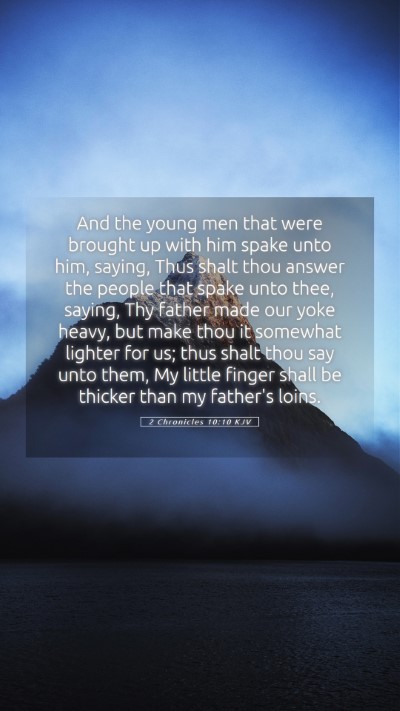Bible Verse Commentary on 2 Chronicles 10:10
Verse: "And say to the people that you will serve, you shall say to them, 'My little finger shall be thicker than my father's loins.' (2 Chronicles 10:10)
This verse falls into a critical moment in biblical history where Rehoboam, the son of Solomon, is faced with the requests of the people of Israel after the death of his father. The significance of this verse and its implications require a deeper understanding. Let's delve into the insights on this passage from respected public domain commentaries.
Understanding the Context
The events recorded in 2 Chronicles 10 deal with the pivotal transition from the united monarchy of Israel to its eventual division into the northern kingdom (Israel) and the southern kingdom (Judah). The chapter describes how Rehoboam's actions and decisions ultimately led to this division.
Interpretations and Insights
- Matthew Henry's Commentary:
Henry notes that the request of the people was for relief from the heavy burdens imposed by Solomon, their king. They seek a promise of lighter yoke (1 Kings 12:4), seeking wisdom in the face of their suffering.
- Albert Barnes' Notes:
Barnes emphasizes the harshness of Rehoboam's response as he boasts about his power. He illustrates the foolishness of underestimating the people's grievances, ultimately leading to disaster.
- Adam Clarke's Commentary:
Clarke points out that Rehoboam's statement reflects a profound misunderstanding of leadership. Instead of responding with compassion, he embraces an attitude of superiority and increased demands.
Key Themes
- Leadership and Authority:
The verse encapsulates Rehoboam’s wrong approach to leadership. He equates strength and authority with oppression rather than service and humility.
- The Fallibility of Human Reasoning:
This moment is a clear illustration of the consequences when leaders rely on their own wisdom rather than listening to the voiced concerns of their people.
Application of the Verse
Understanding Scripture, especially challenging passages such as this, sheds light on the importance of humility and servitude in leadership roles today. The lessons drawn from Rehoboam's poor decision-making can be applied to modern scenarios, particularly in leadership, governance, and personal relationships.
Cross References
- 1 Kings 12:4 - The people's request for lighter burdens.
- Proverbs 12:15 - The wisdom of listening.
- James 1:19 - Be quick to listen, slow to speak.
Conclusion
This verse from 2 Chronicles serves as a reminder of the overarching themes of authority, humility, and the weight of leadership. Leaders are called to listen and serve rather than dominate. Through proper Bible study insights and scripture analysis, believers can glean lessons that encourage them to embody a spirit of understanding and compassion in their lives.
In summary, 2 Chronicles 10:10 is not just a historical recount; it provides a profound Bible verse meaning that resonates through generations, calling for humility in leadership as well as the importance of communal concern.


